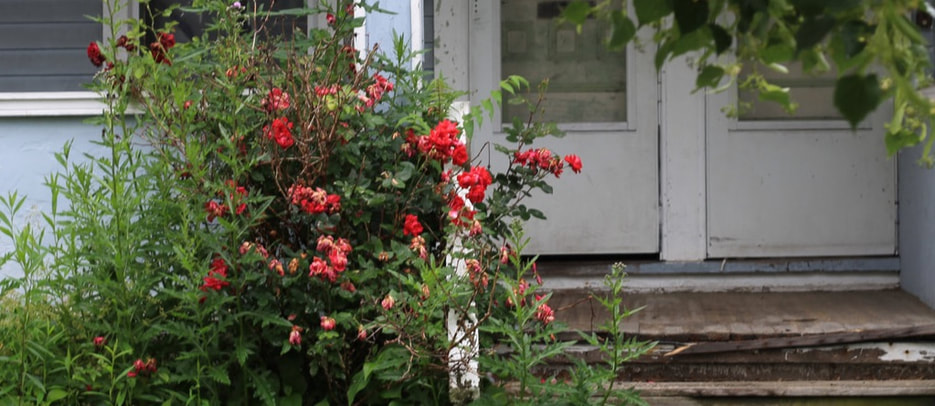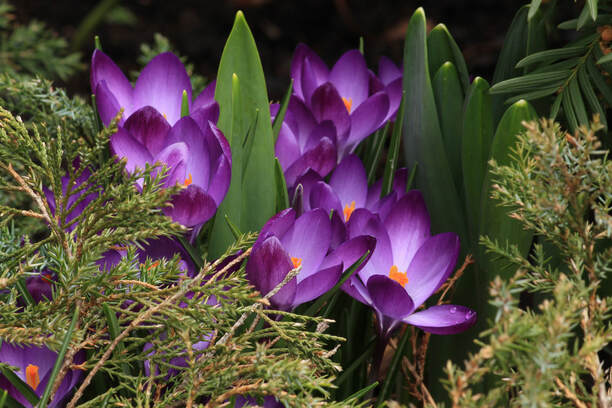|
A topic that came up this week was the practice of cosmetic mulching. It is difficult to sort through as the majority of mulch put down and spread may in fact be IMAGINED as just that, cosmetic.
In the business, it seemed everyone this week was racing to find the science to prove how essential mulching was as the County Executive had declared "no mulching, its not essential; only maintenance." I didn't have to look it up. It has been there forever but I had all these people sending me bits and pieces - "I found this document on mulch from the Alabama Cooperative Extention!" or "Look! Cornell says mulch has all these benefits." This is part of our complication. Mulch does many things, depending on what you mulch with. All mulch will help insulate the soil and moderate soil temperatures; moisture is held in the soil and its evaporation prevented by a blanket of mulch. Root crowns are protected. Erosion from heavy rains that expose roots is prevented. These are almost what we may just call "mechanical and technical benefits." From there different mulches can do different things. Peat Moss will reduce a soils pH, improve a soil's structure, and aid in moisture retention. Compost probably brings the most fertility and in the organic practitioners' practice, is used to manipulate and encourage biological activity that will suppress diseases, provide harbor to beneficial microfauna keeping pest populations in control, as well as influencing the bacterial and fungal relationships in the soil that dictate what forms of nitrogen become available to plants. Gravels are also a mulch and work best where there may be a lot of foot traffic or erosion potentials. Shredded Hardwood bark gives one all the mechanical advantages of mulch while also having superior weed suppressing abilities. A landscape garden, in all reality, HAS TO BE covered in a mulch. If you leave a bare soil open you will find that within few weeks time it will be covered in spontaneously germinated weed plants. But. As horticulturists, we already know this and it structures our practices. "Mulching" - a very important word here - as a verb form, indicating it is an act performed, goes back to the middle of the 1700s where the word was used for the first time. I may speculate that the first mulches were leaves, sticks, or any coarse material one could find and it would be placed around whatever it was that was trying to be grown, most likely small scale food crops. The way we often talk about mulch now is in the context of ORNAMENTAL landscapes and gardens. A conversation as to whether mulching is essential therefore needs to consider exactly what is being done when mulching. When I was a kid, there was only decorative gravel, bagged Pine Bark Nuggets, and bales of peat moss commercially available. Soon, in the late 80s, shredded bark started to become a thing. Even since then, the material qualities produced in a shredded bark mulch have changed in a big way. It used to be course in texture and a rich brown color was considered the highest quality. Reddish mulch became available locally in bags. Then "Black Gold" which was near black became available, and in the last 10 years now, we have seen massive capital investment in mulch shredding machines that inject colored dyes to artificially influence the color. I remember long ago, my grandparents house, in the back yard, behind a tall sheered Privet hedge and a gate, was a garden and compost bin where all the yard waste and food scraps went. The compost was recycled as a mulch. Mulch, like the early use of leaves, sticks, or mosses, was what material was available for "mulching." It was a practice of gardening. Now, tall pallets of bagged mulch await homeowners at every 7-11 and gas station. People want specific mulch, "I want black mulch," because it has become what looks nice to them. In many ways, someone doesn't need to know how to design a landscape - a good layer of mulch can look as nice as anything. But there are still out here horticulturists that depend on mulch to hold weeds down, hold moisture in, protect, and grow plants - without which would lead to a large increase of work to maintain the garden. To the horticulturist and gardener, to the growers of plants, the material spread as mulching is as much a tool as fertilizers, pesticides, or round-up, only it's, we'll say, a more local solution. To the growers mulch is an essential tool to sustaining a landscape. To others, with a different practice and imagination, the mulch is itself what looks nice. It doesn't do anything, it is only cosmetic. Mulch is a material that for the gardener does something. Over time garden practice has led to advancements in and the development of better mulch materials, finer textures, richer colorings - but so far as to where the material development itself has taken over, to where often it appears the dominant form of gardening now excludes the plants and finds all its pleasurable experiences in just the aesthetics of mulch. The pleasing experience people now how have with mulch is the end point of the development of a field of work, a craft, where artists, or gardeners, of craftspeople, what ever you wish to call them, have over a period of time, refined and processed their materials - mulch - and learned dexterities and techniques to smooth and spread - mulching. But now, I am finding myself in a historical place where I am told not to mulch because it is ONLY aesthetic, cosmetic. I am happy to comply with the law, but it is pretty degrading to a horticulturist's practice and everything they know and believe, to be forced into this loyal acquiescence. Cosmetic mulching in many ways embodies a hundred years or more of the development of human skill and intelligence in gardening. Its experience elevated the material technology to where "mulching" has become a separated professional specialization, disconnected entirely from a relationship with plants. It is the modern cultural form. But there are still horticulturists and growers. Not many. 5/10/2022 04:22:31 am
What an exquisite article! Your post is very helpful right now. Thank you for sharing this informative one. 12/14/2023 04:42:57 am
Book sexy call girls from the best and reliable Aerocity Escorts Service. Our professional call girl services in Aerocity. Call 9718804775 now!! Visit here for more information:-https://delhicallgirlservice.in/aerocity-escorts.html Comments are closed.
|
Matthew DoreLandscape designer and Proprietor of Buffalo Horticulture Archives
April 2020
Categories |
Telephone(716)628.3555
|
|


 RSS Feed
RSS Feed